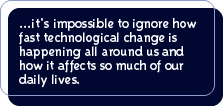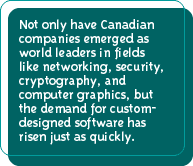|
Decades ago, science fiction writers imagined a time
when we would have information at our fingertips and almost infinite
power and knowledge in the palms of our hands.
Look around. That time is now.
From the blue glow of a computer monitor to the brilliant
luminescence of bundled optic fibres, we live in a world of shimmering
light, surrounded by the invisible power of electricity. We are living
in the information and communications revolution. Those words are such
media staples, that it's sometimes hard to take them  seriously.
However it's impossible to ignore how fast technological change is happening
all around us and how it affects so much of our daily lives. Just over
two decades ago, people laughed when Steve Wozniak, one of the creators
of the Apple computer, said he would someday have his own home computer.
Only 20 years ago, the idea that anyone but the mega-rich would own
their own satellite TV dishes was utterly absurd. seriously.
However it's impossible to ignore how fast technological change is happening
all around us and how it affects so much of our daily lives. Just over
two decades ago, people laughed when Steve Wozniak, one of the creators
of the Apple computer, said he would someday have his own home computer.
Only 20 years ago, the idea that anyone but the mega-rich would own
their own satellite TV dishes was utterly absurd.
Yet here we are.
We send e-mail with our home computers and our telephones
and televisions are plugged into a data-, voice-, video-, and multimedia-
communications systems that spans the globe. And new technologies emerge
every day, enhancing and adding to the tools we already have. It's hard
not to get the feeling that we are living in that gleaming, electric
future imagined so long ago.
All of this activity has had a profound impact on the
Canadian economy. As one of the world's most advanced industrial economies,
Canada is a leader in high technology and telecommunications. Communications
industries now  account
for almost $25 billion of the national economy, up from $12.4 billion
fifteen years ago. In that same period, manufacturing electronic and
electric products has grown from a $4.5 billion to a $10 billion industry. account
for almost $25 billion of the national economy, up from $12.4 billion
fifteen years ago. In that same period, manufacturing electronic and
electric products has grown from a $4.5 billion to a $10 billion industry.
The Canadian software development industry has been
growing dramatically for the past decade. Not only have Canadian companies
emerged as world leaders in fields like networking, security, cryptography,
and computer graphics, but the demand for custom-designed software has
risen just as quickly. Also adding to the growth are Canadian specialty
television channels such as MuchMusic, TSN, and History Television,
which have created a demand for trained broadcast technicians.
In fact, the deregulation of the telecommunications
industry has not only created a far more competitive marketplace, but
also a shortage of trained workers in the high technology and communications
industries. This shortage has reached crisis proportions and left many
companies scrambling to find qualified technicians and technologists.
Jobs are being created faster than people are being trained to fill
them.
That means that the areas of high technology, electronics,
and communications are full of opportunities for new graduates. Making
the picture even rosier is the fact that professionals in these fields
are making excellent  money.
Companies are willing to do almost anything to recruit and retain skilled
employees. More importantly, even though colleges and training programs
are working to meet the demand, the job opportunities in Canada's high
tech and communications industries are expected to keep growing well
into the next century. money.
Companies are willing to do almost anything to recruit and retain skilled
employees. More importantly, even though colleges and training programs
are working to meet the demand, the job opportunities in Canada's high
tech and communications industries are expected to keep growing well
into the next century.
Related industries are also keeping pace. The information
revolution has created an extremely competitive market that is "profoundly
altering the electricity industry worldwide." Constant change is forcing
producers of electrical power to reinvent themselves and develop new
technologies to meet the changing needs of their customers, and to provide
even greater service reliability than was ever thought possible. To
meet the challenges of the next century, the business of producing and
managing electricity has itself been altered by the technological revolution
to which it supplies power.
 In
1999, representatives of the electricity industry were quoted as saying
that their field has "finally entered real-time, a state in which there
is no time for planning, no time for decision review, only time to act
now." The key is to find technicians and technologists willing to take
this challenge to the front lines of the information revolution. In
1999, representatives of the electricity industry were quoted as saying
that their field has "finally entered real-time, a state in which there
is no time for planning, no time for decision review, only time to act
now." The key is to find technicians and technologists willing to take
this challenge to the front lines of the information revolution.
We have seen the future, and it is electric.

|